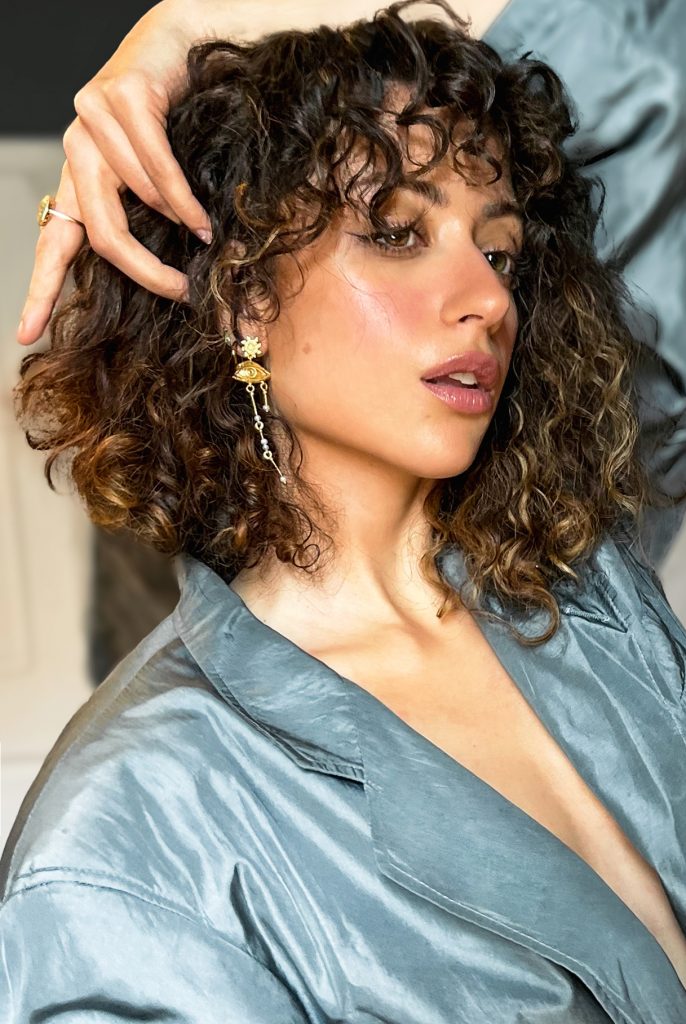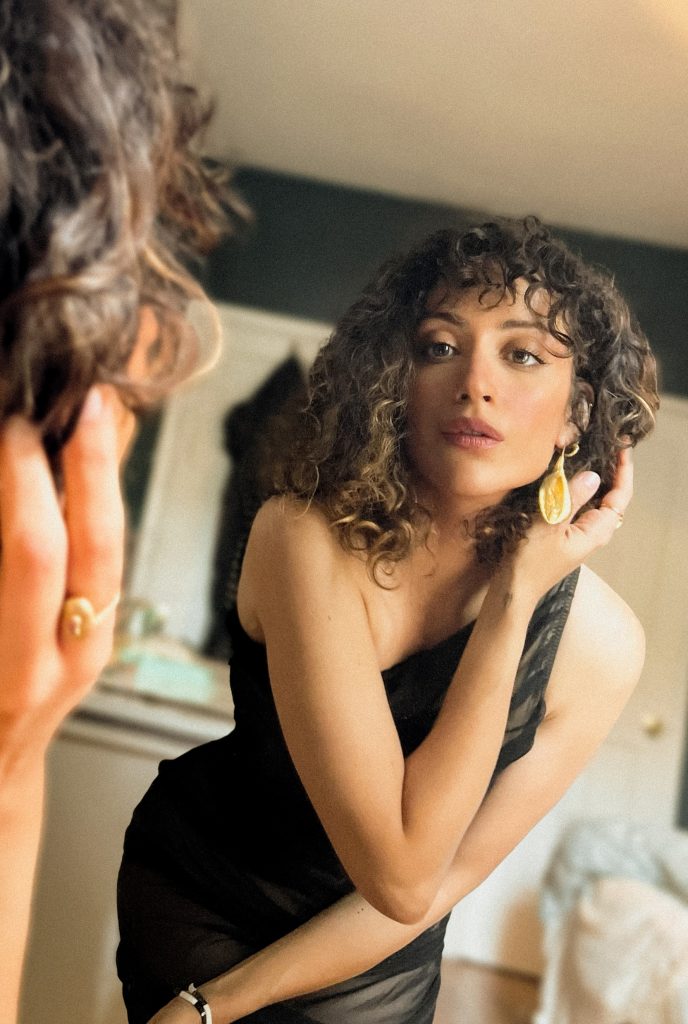Scoop Empire spoke with Rosaline Elbay in an exclusive interview, star of the hit series Ramy and lead in the upcoming off-Broadway show Dodi and Diana, about how she got into acting, actors and actresses that have inspired her, and the differences between the Egyptian and American film and television industries.
Over the last four years, you have exploded on to the scene and established yourself as an important up-and-coming figure in Egyptian and American TV and film. However, many moons ago, you were studying classics at Oxford. How and why did you end up getting into the world of acting?
I started doing theatre during my first term at Oxford and it took over my life embarrassingly quickly. I think everyone saw what was going to happen before I did — I was so stubbornly convinced that it was a hobby that I refused to apply to drama school and did an MA in colonial history instead (drama school won in the end; I ended up doing my MFA). The running joke in my family is that all of my life decisions were based on The Mummy — I wanted to be Evie, then I realised I wanted to play her. I say a joke, but I’m lying, really; it’s not wrong. I do want to be Evie. …We should all want to be Evie.
As an Egyptian woman, with a British accent, living in the United States, have you found that your unique perspective and position across several film and television industries has been a help or a hinderance, or both?
I don’t know that I think of it strictly in those terms. I have come to recognise that my position is somewhat unique, definitely; particularly in the US, where a lot of people expect me to relate exclusively to the first-gen experience when what I am is actually a full-blown immigrant. I’m grateful for how well I know and how deeply I love where I’m from, and my understanding of the historical and personal accidents that have produced me, I guess. Somewhere around my MA I realised that whenever anyone’s surprised by my accent I could tell them it’s a “product of colonialism” and I’ve found that people understand that better than you might expect.

How have you found navigating the Western film and television industry as an Arab woman as compared to your experiences working on Egyptian productions? And will we see Rosaline Elbay on Egyptian cinema and television again soon?
I’m so deeply open to working in Egypt again; it’s so important to me, and I’ve always maintained that I’ll go back for a project that’s right. There’s so much nuance needed for a proper response to that first question. Both industries present their perks and challenges, and there’s more commonality than I think people might expect, too.
From putting on Shakespeare performances to featuring in Egyptian film and television, to now starring in big-budget American productions, your acting career is incredibly diverse. Have you found differences in how you have to act between continents and genres?
Not necessarily, no. I guess I approach everything with the same fear, which is a useful thing to feel. If I’m not afraid of a project there’s no point in really doing it; I want to get better on every job, because I’m still very much a work-in-progress. And I try to put the same depth of work into everything I do.
You’re an actress that has worked in the UK, Egypt, and now America. Have you found any differences in the kind of roles you are offered in Egypt and the US or UK?
Absolutely. All three industries are changing, of course. I will say that progress has been happening in the UK and the US, in theatre and on screen, in terms of the breadth of roles people like me have been offered — and that always comes from increased diversity behind the camera and among people in decision-making positions. There’s a lot to be done, still. But it is easier to have conversations about representation than it was a few years ago.
You’re heading back to the stage and doing a show off-Broadway next month, can you tell us a little about the show?
It’s called Dodi and Diana, but, without giving away any spoilers, the characters we’re playing are a couple in the modern day — an Egyptian-American actor, Samira, and her Canadian banker husband, Jason. It’s being directed by Adrienne Campbell-Holt, who’s just a dream and an excellent curator of new pieces, and was written by Kareem Fahmy, who’s a Canadian-Egyptian playwright. And I get to act opposite Peter Mark Kendall, who’s a dear friend of mine and whom I also worked with on Kaleidoscope (a new Netflix series which will get its release date soon).

How does it feel like to going back into theatre? And does your interest in theatre stem from the rich tradition of Egyptian theatre you must have seen much of on the television while growing up in Egypt or from your experience with Shakespeare in the UK?
It’s absolutely terrifying (I haven’t done a play in five years), but has thankfully felt like coming home. There’s nothing like it, especially when workshopping a new piece, which we’ve spent this summer doing with this one. I grew up watching Egyptian theatre — I know those plays by heart, and they informed so much of who I was and my sense of humour. And of course all of my theatrical experience and the majority of my stage training was in the UK. Shakespeare was only a small part of that — it’s my favourite thing to do, acting-wise, because heightened text is so delicious — but I’m actually more interested in new playwrights and perspectives yet unseen. I owe a lot to both those traditions, of course. But I think above all my interest probably boils down to a love of storytelling, and that’s all because of my mum.
On your busy schedule, you also have an impressive-sounding series with Netflix coming up. Can you tell me a little about this show and what character you will explore?
Thank you — it’s called Kaleidoscope, and I can’t say much yet, but my character is Judy Goodwin, this wonderful genius-woman who’s a chemistry and demolitions expert for our heist crew. It was created by Eric Garcia, who wrote Matchstick Men and many other brilliant things, and who was also our showrunner. We’re a fun new experiment for Netflix; it’s their first series to explore a particular type of non-linear storytelling, so I’m excited to see the different ways our audience chooses to experience it. And I got to work with people whose work I’ve admired for decades and have come away with friends and a show-family that I’ll treasure throughout my life. So it’s been a really special chapter, personally.
Egypt has an incredibly rich cinematic history that has been loved and appreciated throughout the Arab region. As an actress, writer and producer, is there anyone from the history of Egyptian cinema that sticks out as a particular inspiration for you?
I’m very much into the early history of Egyptian cinema and theatre; and cabaret, because they’re all intertwined. The pioneer women who built this industry are a constant inspiration for me, in their bravery and their genius and their determination — Aziza Amir, Mounira Al Mahdiyya, and Shafiqa al Qibtiyya to name only a few.

Likewise, is there anyone from the American film industry who sticks out as an important influence on your acting work?
Many. Women, women of colour; particularly Black women, who are always paving the way across American industries for other minorities to be able to live truthfully and safely.
Out of all the roles you have played either on stage or on screens, like Amani in Hulu’s award-winning Ramy or as Sara on MBC Masr’s Qabeel, which role have you related to most?
I relate to every role I play — I think I need to, to be able to do it. There are elements of each of them in me, and elements of them I hope I keep; even though I actually think they’re both very different to me in fundamental ways. Amani on Ramy was a particularly special experience because she was a character I wish I’d been able to watch growing up, and she sort of collided two of my worlds together in a way I never thought I’d be lucky enough to experience — in a way I’d never imagined up until that point, actually. And I was also fortunate enough, on both Ramy and Qabeel, to work with people I love to absolute death, and who valued my input when it came to fleshing those characters out. So Amani and Sara are both very dear to me.
You’re still very early in your career and you’ve surely got many memorable performances up your sleeves. If you could choose, what would be your dream role to play?
Gosh, I don’t know. Probably a modern adaptation of one of the Greeks. I have a huge soft spot for classical plays really adapted well.
And finally, what would you say to any Arab women who want to get into the often scary-looking and ultracompetitive world of acting?
I don’t love the term ‘Arab’ used to describe us all — but what I’d say to any self-identifying North African or South-West-Asian or Arabic-speaking woman who wants to do this: Just do it. Please. We need you. There’s a misconception that there’s only room for so many of us at a time, and it’s a lie that’s been peddled forever by dominant groups, and it’s traumatised some of us into thinking there’s no place for us to fit. It isn’t true. There’s strength in numbers, always. Collaborate with peers. Create your own work; the work you want to create, not what anyone tells you is what people ‘want to see’. Don’t let anyone tell you you shouldn’t do it or, worse, that you aren’t allowed. If you tell your story, if you even exist in this space, you’re inspiring someone else to do the same.
WE SAID THIS: Don’t Miss: Top Arab Films To Check Out At The 79th Venice Film Festival


